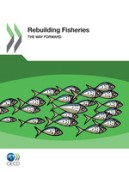Pêcheries
Rebuilding Fisheries: The Way Forward
|
Rights-based management (RBM) measures are driven by economic incentives but can also achieve biological goals such as rebuilding fish stocks. For example, a tradable rights system introduced by New Zealand contributed to a successful rebuilding of its hoki fisheries, while in Iceland a quota system has helped stocks of capelin recover from near collapse in 1980 to sustainable levels today. These and other case studies are available to read and download below, along with inventories of national and regional approaches to fisheries rebuilding programmes. |
|
Background reports
This book is complemented by the following background reports, which are free to access and download in .pdf format.
Case studies
- Overview of the case studies
- Canada - Pacific Commercial Groundfish Integration Program
- France - Scallop fishery in St. Brieuc Bay
- Greenland - Halibut fishery
- Japan - Snow crab in Kyoto Prefecture, sailfin sandfish in Adkita Prefecture, chum salmon in Hokkaido
- Mauritania - Octopus fishery
- Mexico - Abalone, red grouper, pink shrimp, queen conch fisheries
- Namibia - Hake fishery
- New Zealand - Hoki fishery
- North Sea cod fishery
- Norway - Northeast Arctic cod fishery
- Southern bluefin tuna fishery
- Sweden - Baltic Sea cod fishery
Inventories of national and regional approaches to fisheries rebuilding programmes
- Overview of the inventories
- Australia
- Canada
- European Union
- International Commission for the Conservation of Atlantic Tunas (ICCAT)
- Korea
- Northwest Atlantic Fisheries Organization (NAFO)
- North Atlantic Salmon Conservation Organization (NASCO)
- North East Atlantic Fisheries Commission (NEAFC)
- New Zealand
- Norway
- Turkey
- United States
Access this publication
» Read the complete book online
» Order the print edition from the OECD Online Bookshop
» Download the full book or individual chapters from the OECD iLibrary (subscription access)
» Government officials can access the publication when they log in to OLIS, the OECD committee information service
Documents connexes
